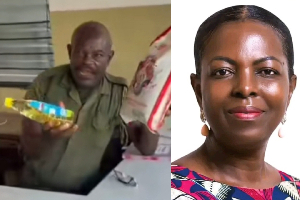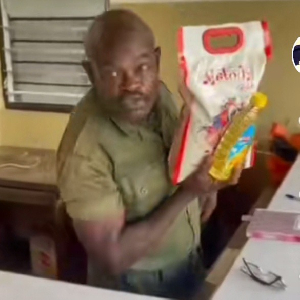
Hon. Lydia Alhassan Seyram, the Member of Parliament for the Ayawaso West Wuogon Constituency, has come under heavy fire from a security guard at the University of Ghana who is thought to be between 50 and 60 years old. The guard is accused of trying to influence his vote by using a small bottle of cooking oil and a 5 kg bag of rice. In an interview, the vocal guard expressed his dismay at the absence of genuine interaction with voters.

He stated unequivocally, "This is what Lydia Alhassan has given me for the past eight years." For the last eight years, it has been only cooking oil and a bag of rice. These items cannot be used to buy my vote for you. I will never vote for her. Regretfully, Ghanaian politics are like this. Instead of rice and oil, we need development initiatives and sound policies.
On social media, the guard's remarks have generated a lot of conversation, and many Ghanaians have praised him for being honest. Some conjectured that he may vote for John Dumelo, the National Democratic Congress' (NDC) parliamentary candidate for the constituency, as a result of his frustration. Popular actor-turned-politician Dumelo has gained a lot of respect in the community for his community-based projects and active involvement.
Hon. Lydia Alhassan's detractors contend that her purported strategy exposes a larger problem in Ghanaian politics, where voters are frequently presented with material things rather than long-term fixes for urgent issues. A Facebook user from the constituency stated, "This is not just about one man refusing a bribe; it's a reflection of the growing dissatisfaction with token gestures in place of real development."
Others, on the other hand, defended the MP, pointing out that politicians frequently give away these kinds of things as tokens of goodwill, particularly during election campaigns. They contend that the gesture may be an expression of gratitude to constituents rather than a bribe.
There is greater room for speculation regarding the incident because Hon. Lydia Alhassan, a member of the New Patriotic Party (NPP), has not officially addressed the accusations. This incident highlights the heightened scrutiny Ghanaian politicians are subject to as the general elections of 2024 get near, as voters prioritize responsibility and meaningful leadership over temporary rewards.